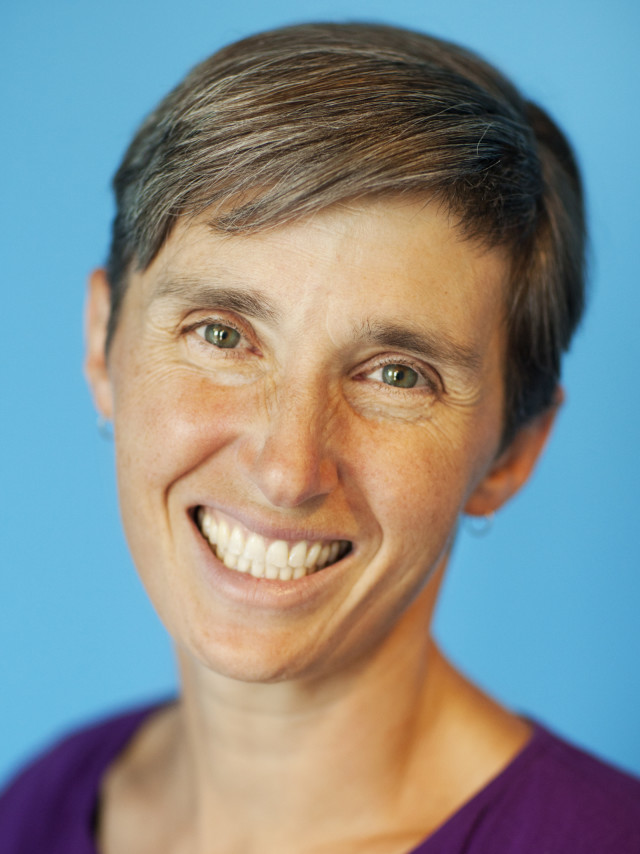Q&A: Oregonian Emily Harris, NPR's Jerusalem Correspondent

How much time have you spent in Gaza during the current crisis? I got to Gaza Thursday, July 10, two days after Israel formally launched its air operation. I left Tuesday, August 5, the day the 72-ceasefire that lasted for a few days and included negotiations in Egypt began.
What was it like to return to foreign correspondence after hosting Think Out Loud? It was fun. I like hosting because of the immediacy of a live conversation and the relationships and dynamics of a time-constrained interview. I like field reporting— internationally or otherwise—because you get to get out of a studio and see people in their own space. You see, feel, smell the place of action—and, of course, record as much storytelling sound as you can find.
Did you choose the Jerusalem bureau? If so, why? How has working there differed from your previous oversea assignments? I’d been interested in Jerusalem as a possibility after my NPR posting in Berlin, but at that point, Think Out Loud won as the most intriguing option. When the chance came up later, I knew instantly I’d love to do it. I just relished the opportunity to be in this ancient and diverse part of the world, with the mission of trying to understand it. I have a lot less physical territory to cover now than when I was in Europe or Russia. One big challenge is getting past the well-ingrained narratives of the Israeli-Palestinian conflict.
How difficult is it for you to get into, out of, and to operate within Gaza? Over the past year, I tried to make it to Gaza at least a couple of days each month or so. For journalists accredited with the Israeli government, it’s not hard. I drive from Jerusalem. It’s about an hour and 15 minutes to Erez, the only crossing travelers can use. I leave my car on the Israeli side and go through Israeli passport control. Then I walk about a kilometer on a caged pathway through sort of a no man’s land. That ends at a little waiting area with a coffee stand and a passport office run by Fatah / the Palestinian Authority. Although Hamas was running Gaza, the Israelis couldn’t talk to them, so this Palestinian check-in spot was for coordination of travelers.
Then I’d hop in a cab and get a ride less than a mile down the road, to the Hamas checkpoint. They’d type my passport number into a computer and bring a woman over to poke through my bag. I was told they were on the lookout for alcohol. When I went in July 10, two days after this war began, a recently constructed Hamas checkpoint building was bombed out. Interior ministry officials were recording entries in a notebook on the sidewalk a couple blocks away. Hamas stopped doing any entry check-ins at some point, but I heard as I left that they may have been starting up again. Leaving Gaza can be quite a wait, as Israel has stringent security systems in place, including back-scanners, hand searches of luggage and sometime strip searches.
Have there been any recent incidents where you felt personally in danger? Can you describe one? How do you deal with dangerous situations? For me, the most frightening time in Gaza was one night of intense Israeli bombardments around the area where I was staying. I felt fairly safe in the hotel, but the explosions were just so loud, so close, and went on so long. Bed shaking, ceiling paint falling—that kind of thing. I put on my flak jacket and moved away from the windows. Another evening, I was downstairs in the hotel when a rocket was launched out toward Israel. It was so loud I dove on the floor. I was sure it had been fired from just outside the window. It turned out to have been launched from about 400 meters away.
One of the biggest challenges to reporting was figuring out where would be safe to go. Often we would be out interviewing people and hear explosions. Generally we just tried to be aware of our surroundings and if there was bombing going on, not stay too long.
What do you do to keep from getting personally overwhelmed by the situation? On the first day of the ground invasion I bought an electric teakettle, a jar of instant coffee and a box of tea. Just so I could have a cup of something to hold onto or let sit by me and steam whenever I wanted. I had been there a week at that point. On the second day of the ground invasion I did 20 minutes of yoga. But really what allowed me to keep going was that there was always work to be done. Something to learn, check, write, tell.
When you're in the heart of reporting in a conflict zone, do you ever yearn for the Think Out Loud host chair? What do you miss most? Least? Usually in that kind of situation my attention is focused on the immediate. I’m not thinking about anything or anywhere else. What I miss most about Think Out Loud is focusing on Northwest issues and stories. What I miss least is the routine. Between show logistics and family needs, I probably slept only 4-5 hours a night for those years.
What do you think would surprise Portlanders the most about the daily reality of the current crisis? Maybe that lots of people barely flinch at explosions unless they are really very close. Maybe that Israeli reporters weren’t there (the Israeli government forbids Israeli civilians to enter Gaza). Maybe that I bought a pack of yummy fresh buttery walnut filled cookies from a local bakery about halfway through the month. They were not available later.




